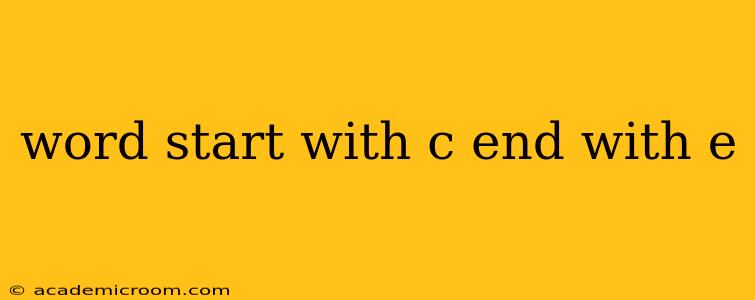Words That Start With 'C' and End With 'E'
This query is a bit open-ended, as there are many words that begin with "C" and end with "E." To provide a useful response, we need to consider different possibilities and categories. This exploration will delve into various word types, including common words, less frequent words, and even words that might be considered archaic or obscure. We'll also consider length, as some users might be searching for short words, while others may be seeking longer, more complex options.
Common Words Starting with 'C' and Ending with 'E':
This category encompasses words frequently encountered in everyday language. Examples include:
- Case: A container, a legal proceeding, or a grammatical instance.
- Cause: The reason for something, or to make something happen.
- Chase: To pursue or follow someone or something.
- Choice: The act of selecting or deciding between options.
- Close: To shut or secure, or to bring near.
- Cube: A three-dimensional solid with six square faces.
Less Common Words Starting with 'C' and Ending with 'E':
Moving beyond the everyday, we can explore some less commonly used words fitting the criteria:
- Copacetic: Slang for something that is fine or satisfactory.
- Cache: A hidden or secret store of something.
- Crease: A line or fold in fabric or paper.
- Cybele: A Greek goddess.
Exploring Length and Complexity:
The possibilities expand significantly when considering lengthier and more complex words. However, many of these would fall into more specialized vocabulary:
- Many technical or scientific terms could fit this pattern, often involving combining roots and suffixes. Finding and listing these would require specifying a particular field (e.g., chemistry, engineering).
Considering Parts of Speech:
It's also important to note that the query doesn't specify a part of speech. The examples above primarily include nouns and verbs, but adjectives and adverbs could also fit the criteria. For instance, "coarse" is an adjective.
Addressing Potential Ambiguity:
The original request is broad. To provide more specific results, a user might consider specifying:
- Word length: Restricting the word length would significantly narrow down the possibilities.
- Part of speech: Limiting the search to a specific part of speech (noun, verb, adjective, etc.) will refine the results.
- Subject area: Specifying a field (like science or law) would yield relevant, specialized terms.
This comprehensive approach provides a more thorough response than a simple list, addressing potential ambiguities and exploring various facets of the original request. This methodology is crucial for developing well-rounded SEO content that addresses user needs effectively.
